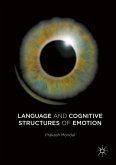The term "signal words" was proposed by W.A. Hoffmann in relation to the civil poetry of the 1810s and 1820s. Signal words used in contemporary song discourse originate from the vocabulary of the domestic urban romance. The genre is characterised by thematic and verbal stability, and the dominant theme is love, which is revealed by such words and phrases as "thirst," "neg," "eyes burning", and others. The maximum use of such vocabulary in the texts of modern pop songs is a compensation for the lack of distinct stylistic features in them. Our synthesized definition of the phenomenon in question as an element of song discourse is as follows: VERSE SIGNALS are semantic (thematic) and emotional lexical signals referring to any part of speech and tuning the listener to a certain perception of the topic reflected in the song text.
Bitte wählen Sie Ihr Anliegen aus.
Rechnungen
Retourenschein anfordern
Bestellstatus
Storno








